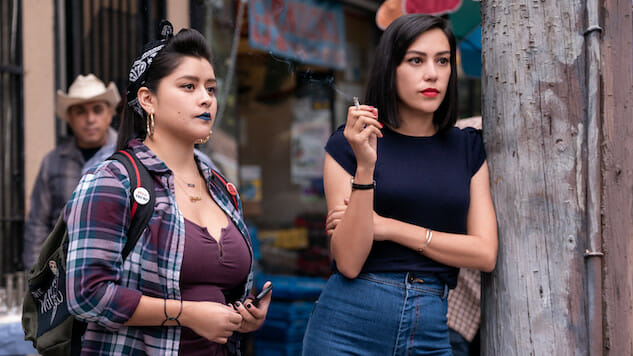Vida’s Identity-Focused Season Finale Raised More Questions Than It Answered
Thankfully, we're getting a third season.
Photo Courtesy of Starz
![]()
In the Vida Season Two finale, Lyn stands on the steps of the suddenly thriving bar and attempts to reason with the Vigilantes protesting it. “What did we do wrong?” she asks, detailing how long the bar has been there, how her grandfather built that very building and how her family has had roots in the neighborhood for five decades. She adds that every single person hired at Vida is Latinx, as are all of the musical acts they book. “What more do you want?” she cries out before Yoli douses her in detergent that burns her eyes.
Creator Tanya Saracho has always grounded Vida’s story in one of identity, as sisters Emma and Lyn came to terms in the first season with their late mother’s queerness and what it meant for their own lives. Emma, who was punished for her interest in girls, cannot forgive her mother’s hypocrisy, and is also at constant odds with Vida’s wife Eddy. The legacy of the bar (now officially called Vida) has also been a bone of contention between Emma and Eddy, and the catalyst (in this new season) for Lyn to come into her own.
The protest scene was integral to series’ core themes in a number of ways: Lyn stood up and was accountable for Vida, Emma put family over personal grievances and attacked Yoli on Lyn’s behalf, and then there was Mari who stood there in the background caught between two worlds. The Hernandez sister have always (to Mari and her friends) represented a “whitina” version of Latinx culture, gentrifiers who have no interest in preserving their neighborhood. That both is and isn’t true; Emma and Lyn want to keep Vida open and operational because of its place in the community and as a safe haven for queer customers, but to do so they have to open it up beyond being a niche dive bar. Mari came to see this complicated truth in her time living with them, and it all plays into the overall theme of identity—what does it mean to be a “real” or “authentic” Latinx person, and who are those who deem themselves gatekeepers? There’s certainly a difference between the self-hate of a person like Nelson than how Emma and Lyn are trying to learn and lean into a culture they weren’t really raised to be a part of.
Those definitions also came into play earlier in the season when Emma met Cruz’s friends, who tried to immediately define her. Lesbian? Queer? Bisexual? Tourist? It was that scene which vitally brought Nico to Emma’s aid (the first of many time throughout the season), as she lambasted the group for gatekeeping and engaging in the same kind of definition-obsession that has made the queer community feel “other.” Essentially, how small does your group have to get before you’re satisfied that it’s only the “real” people left? What does that even mean? Do you yourself even qualify?
-

-

-

-

-

-

-

-

-

-

-

-

-

-

-

-

-

-

-

-

-

-

-

-

-

-

-

-

-

-

-

-

-

-

-

-

-

-

-

-








































